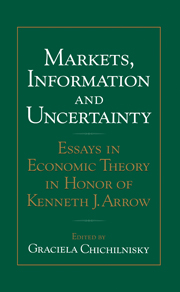Book contents
- Frontmatter
- Contents
- Preface
- List of contributors
- Section I Information and markets
- Section II Uncertainty and finance
- Section III Market externalities and justice
- 8 Moral hazard and independent income in a modern intertemporal-equilibrium model of involuntary unemployment and mandatory retirement
- 9 On the optimal schedule for introducing a new technology, when there is learning by doing
- 10 Price and market share dynamics in network industries
- 11 Exchange in a network of trading posts
- 12 Equilibrium market formation causes missing markets
- 13 Toward a general theory of social overhead capital
- 14 On population externalities and the social rate of discount
- 15 Trade and Welfare
- 16 History as a widespread externality in some Arrow–Debreu market games
- 17 Redistribution by a representative democracy and distributive justice under uncertainty
- Author index
- Subject index
16 - History as a widespread externality in some Arrow–Debreu market games
Published online by Cambridge University Press: 05 December 2011
- Frontmatter
- Contents
- Preface
- List of contributors
- Section I Information and markets
- Section II Uncertainty and finance
- Section III Market externalities and justice
- 8 Moral hazard and independent income in a modern intertemporal-equilibrium model of involuntary unemployment and mandatory retirement
- 9 On the optimal schedule for introducing a new technology, when there is learning by doing
- 10 Price and market share dynamics in network industries
- 11 Exchange in a network of trading posts
- 12 Equilibrium market formation causes missing markets
- 13 Toward a general theory of social overhead capital
- 14 On population externalities and the social rate of discount
- 15 Trade and Welfare
- 16 History as a widespread externality in some Arrow–Debreu market games
- 17 Redistribution by a representative democracy and distributive justice under uncertainty
- Author index
- Subject index
Summary
Introduction
Among Kenneth Arrow's many highly significant and widely cited contributions to economic science are his path-breaking essays on the two fundamental efficiency theorems of welfare economics (Arrow, 1951), on the role of securities in the allocation of risk-bearing (Arrow, 1953; 1964), and the joint article with Gérard Debreu (Arrow and Debreu, 1954) on the existence of general competitive or Walrasian equilibrium. There is also the joint monograph by Arrow and Hahn (1971). Of these, the first article uses what has since become the standard definition of Walrasian equilibrium, possibly modified by lump-sum redistribution of wealth, and related equilibrium to Pareto efficient allocations. The second article defines what it means to have a complete set of securities markets in a sequence economy with uncertainty. The third proves the existence of equilibrium under what have since become almost standard assumptions. And the monograph with Frank Hahn explores not only the main ideas in general competitive analysis, but also much of the progress in making it applicable to real economic phenomena.
An important feature of Arrow and Debreu (1954) is its conscious use of explicitly game-theoretic ideas, previously found in the related paper by Debreu (1952). A generalization of the usual notion of a game is involved, since there is an auctioneer whose strategy choice determines the price vector. Given this choice, agents are then constrained to choose net trades within their budget sets. Thus the strategic choice of the auctioneer limits the strategies the other players are allowed to choose.
- Type
- Chapter
- Information
- Markets, Information and UncertaintyEssays in Economic Theory in Honor of Kenneth J. Arrow, pp. 328 - 361Publisher: Cambridge University PressPrint publication year: 1999
- 2
- Cited by



